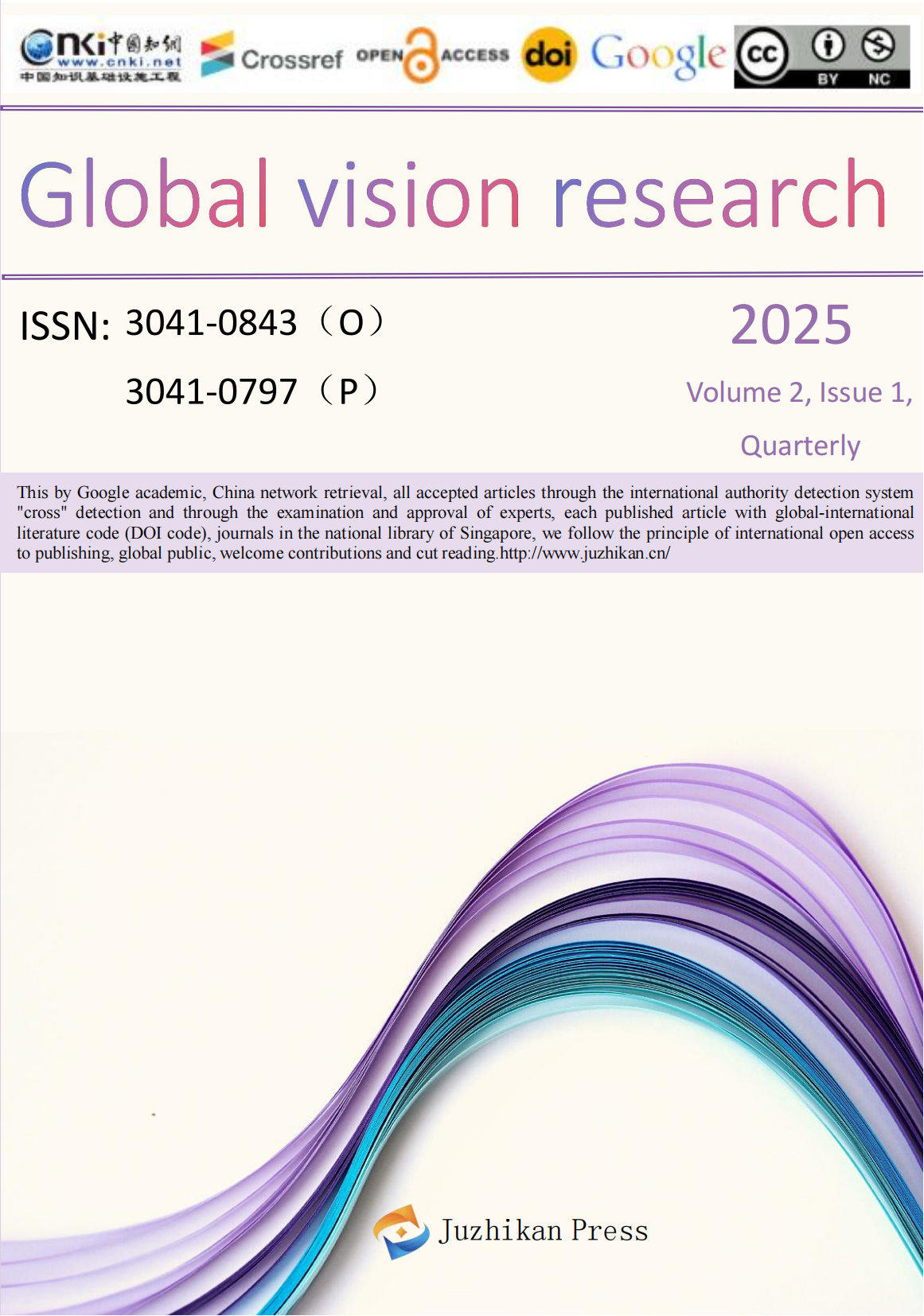 65 84368249
65 84368249 info@juzhikan.asia
info@juzhikan.asia 65 84368249
65 84368249 info@juzhikan.asia
info@juzhikan.asia
Assessing Urban Ecosystem Health in Diverse Climate Zones: A Hybrid Model Approach for Regional Sustainability
Haiyan Huang12 Yuesheng Huang2 Jiayin Liu2 Zhuoyi Chen2
1.Research Center of the Economy of the upper Reaches of Yangtze River, Chongqing Technology and Business University, China, 400067;
2.Guangdong Polytechnic Normal University, China, 510665;
Abstract:Ecosystem health is a necessary condition for the survival and development of the population in the settlement system and the basis for regional sustainable development. Ecosystem health assessment is one of the hot topics in ecological research. This study analyzed the multidimensional factors of the ecosystem in six typical provinces with large populations in different climate zones from 2013 to 2021, Its innovation lies in the ingenious integration of multiple mathematical models and algorithms, the use of descriptive statistical analysis, principal component analysis, T-SNE weight solution and other methods, combined with a comprehensive evaluation scheme based on DDP dynamic programming and T-S fuzzy neural network, to achieve a comprehensive and accurate evaluation of the urban ecosystem. The study shows that the forest ecosystem index, water resource ecosystem index, and atmospheric ecosystem index are highly correlated with urban ecological health. At the same time, the ecological ecological assessment results of different provinces vary greatly, and it is necessary to set up optimized system management according to local conditions.
Keywords: Urban ecosystem; T-SNE GCC-PHAT dynamic programming; T-S fuzzy neural network; Provincial differences
[1]Hu, W.; Liu, J. The Coupling and Coordination of Urban Modernization and Low-Carbon Development. Sustainability 2023, 15, 14335. https://doi.org/10.3390/su151914335.Yan, M., Zhao, J., Yan, S. et al.
[2]Coupling coordination of new urbanization in Chinese urban agglomeration—characteristics and driving factors. Environ Sci Pollut Res 30, 117082–117095 (2023). https://doi.org/10.1007/s11356-023-27469-1.
[3]Ran, C., Wang, S., Bai, X., Tan, Q., Wu, L., Luo, X., ... & Lu, Q. (2021). Evaluation of temporal and spatial changes of global ecosystem health. Land Degradation & Development, 32(3), 1500-1512.
[4]ao, R., Liu, Y., Fei, X., Yu, W., Zhang, Z., & Meng, Q. (2019). Ecosystem health assessment: A comprehensive and detailed analysis of the case study in coastal metropolitan region, eastern China. Ecological indicators, 98, 363-376.
[5]Su, M., Fath, B. D., & Yang, Z. (2010). Urban ecosystem health assessment: A review. Science of the total environment, 408(12), 2425-2434.
[6]Tolstykh, T., Gamidullaeva, L., Shmeleva, N., & Lapygin, Y. (2020). Regional development in Russia: An ecosystem approach to territorial sustainability assessment. Sustainability, 12(16), 6424.
[7]Qiao, W.Y.; Huang, X.J. The impact of land urbanization on ecosystem health in the Yangtze River Delta urban agglomerations, China. Cities 2022, 130, 103981.
[8]Ren, Y.; Zhang, F.; Li, J.; Zhao, C.; Jiang, Q.; Cheng, Z. Ecosystem health assessment based on AHP-DPSR model and impacts of climate change and human disturbances: A case study of Liaohe River Basin in Jilin Province, China. Ecol. Indic. 2022, 142, 109171.
[9]Abbaszadeh Tehrani, N.; Mohd Shafri, H.Z.; Salehi, S.; Chanussot, J.; Janalipour, M. Remotely-Sensed Ecosystem Health Assessment (RSEHA) model for assessing the changes of ecosystem health of Lake Urmia Basin. Int. J. Image Data Fusion 2022, 13, 180–205.
[10]Luo, W., Deng, Z., Zhong, S., & Deng, M. (2022). Trends, issues and future directions of urban health impact assessment research: a systematic review and bibliometric analysis. International Journal of Environmental Research and Public Health, 19(10), 5957.
[11]Peng, J., Liu, Y., Wu, J., Lv, H., & Hu, X. (2015). Linking ecosystem services and landscape patterns to assess urban ecosystem health: A case study in Shenzhen City, China. Landscape and Urban Planning, 143, 56-68.
[12]Yang, H.; Shao, X.; Wu, M. A Review on Ecosystem Health Research: A Visualization Based on CiteSpace. Sustainability 2019, 11, 4908. https://doi.org/10.3390/su11184908.
[13]Tett, P.; Gowen, R.; Painting, S.; Elliott, M.; Forster, R.; Mills, D.; Bresnan, E.; Capuzzo, E.; Fernandes, T.; Foden, J. Framework for understanding marine ecosystem health. Mar. Ecol. Prog. Ser. 2013, 494, 1–27.
[14]O’Brien, A.; Townsend, K.; Hale, R.; Sharley, D.; Pettigrove, V. How is ecosystem health defined and measured? A critical review of freshwater and estuarine studies. Ecol. Indic. 2016, 69, 722–729.
[15]Li, Z.; Xu, D.; Guo, X. Remote sensing of ecosystem health: Opportunities, challenges, and future perspectives. Sensors 2014, 14, 21117–21139.
[16]Su, M.; Fath, B.D.; Yang, Z. Urban ecosystem health assessment: A review. Sci. Total Environ. 2010, 408, 2425–2434.
[17]Londoño, N. A. C., Velásquez, H. I., & McIntyre, N. (2019). Comparing the environmental sustainability of two gold production methods using integrated Emergy and Life Cycle Assessment. Ecological Indicators, 107, 105600.
[18]Li, T., Song, Y. M., Li, A., Shen, J., Liang, C., & Gao, M. (2020). Research on green power dispatching based on an emergy-based life cycle assessment. Processes, 8(1), 114.
[19]Santagata, R., Zucaro, A., Fiorentino, G., Lucagnano, E., & Ulgiati, S. (2020). Develo** a procedure for the integration of Life Cycle Assessment and Emergy Accounting approaches. The Amalfi paper case study. Ecological Indicators, 117, 106676.
[20]Falahi, M., & Avami, A. (2020). Optimization of the municipal solid waste management system using a hybrid life cycle assessment–emergy approach in Tehran. Journal of Material Cycles and Waste Management, 1-17.